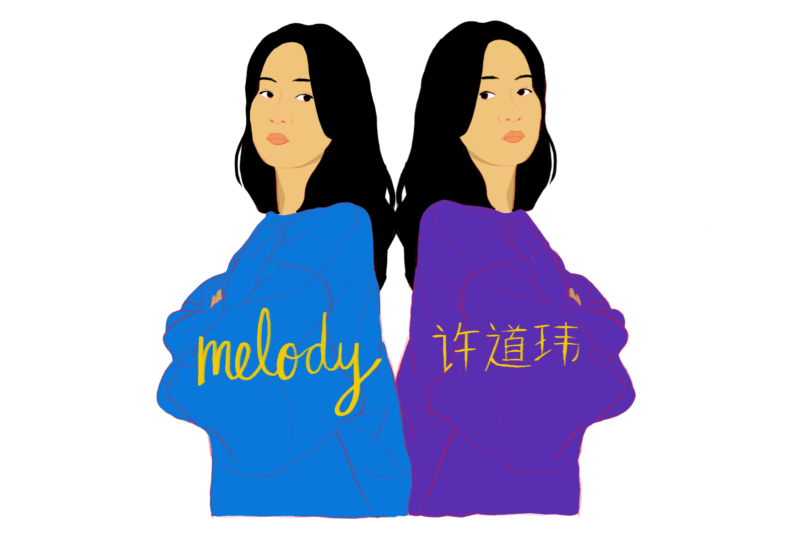“Dao… Wei? Dao-dash-wei?” My third grade self had been dreading this moment — a terrifying but familiar one — for the entire week. I knew from experience that the absence of my normal classroom teacher always came with a substitute who had no way of knowing my preferred name.
“Here,” I said quietly. With that, it seemed like everyone in the classroom physically turned around, craned their necks and squinted to catch a glimpse of my face for themselves, as third graders would. So with 30 pairs of eyes fixated on me — some curious, some confused and some holding back giggles — I hoped they weren’t noticing the tears forming in mine.
My name is Melody Xu, but my birth certificate, passport, debit card, CollegeBoard account, Infinite Campus profile, school ID and practically any place else you might search would tell you I’m a liar. Legally, my name is Dao-Wei Melody Xu, and these documents won’t seem to let me forget it.
The minor complications of having “Dao-Wei” as my legal name have followed me to every doctor’s office, airport and classroom I’ve ever stepped foot in. Every year without fail at my annual checkup, the nurse at Kaiser Permanente squints at their clipboard before calling out “Dao-Wei?” into the waiting room with timid uncertainty. I remember once when I was already running late for an international flight, my tight airport schedule was further delayed by not being able to check in — the airline system’s on-screen keyboard simply didn’t have a hyphen key. And of course, dozens and dozens of these unpleasant roll call memories have piled up over my years of schooling.
Having grown up in America for most of my life, my Chinese name’s permanent attachment to my identity contributed to a festering resentment for the culture and heritage it originates from. I desperately wanted to fit in and feel American, but the whole “Dao-Wei” thing made it pretty hard. It’s taken me years to grow beyond this mindset, but even now I can’t say I’m fully there yet.
The minor complications of having “Dao-Wei” as my legal name have followed me to every doctor’s office, airport and classroom I’ve ever stepped foot in.
Many of my negative feelings about my name stemmed from social interactions in elementary and middle school. For some reason, the riveting topic of middle names was a lunchtime favorite back then, and my nine or 10-year-old soul would feel utterly crushed at the realization that I’d never have a “pretty” middle name to dramatically reveal like what seemed like all of my friends did (some of my favorite middle names were “Anabel” and “Scarlett”).
Of course, I would quickly remember that I did have a pretty middle name: Melody. It’s just that I always thought of it as my first name. Then I would realize if my parents had indeed just swapped the order of “Dao-Wei” and “Melody” on that all-determining birth certificate, my middle name would just be Dao-Wei (and that was still nowhere near “Anabel” or “Scarlett”).
It was just so intensely hard to feel different. From the instant I became aware of the option to file a legal name change, my heart was pretty set on making it the first thing I would do upon turning 18. Officially changing “Melody” to my first name on paper would mean I could finally be the person I saw myself as… right?
From the subtle, self-deprecating jokes I crack about this unconventional first name to the bi-annual complaining sessions I have about it with my parents, it might be easy to assume my attitude hasn’t changed much since the days of giggling classmates and dreaded lunchtime conversation topics, but that’s not necessarily the case.
“Dao-Wei Xu” is 许道玮 in its original Mandarin form. “许” is my family name, linking me to an entire lineage of relatives. “道” is a generational indicator — a previously determined character shared with all members of my generation on my paternal side. And following tradition, my grandpa was the one who chose “玮” for my name after I was born; this third and final character means “beautiful jade,” among other translations.
Whenever I really stop and think about this name’s meaning, I am reminded that it functions as my given identity, and that given identities can be separate from chosen identities.
The role I choose for “Dao-Wei” is an anchor, reminding me of where I, and my family, come from. The role I choose for “Melody” is a representation of where I am now and where I’m going; Melody prints her name on the top right corner of her math tests, and Melody signs the bylines of her articles.
I believe our preferences for our multitudes of identities can evolve over a lifetime without limit. These can include growing out of a childhood nickname overnight and deeming it silly or starting to include your middle initial when filling out forms just for the sake of it; names are just another personal attribute. We have the power to either change them or simply live with them.
I believe our preferences for our multitudes of identities can evolve over a lifetime without limit.
I know that having “Dao-Wei” as my legal name could continue to result in the occasional logistical nightmare here and there, but I don’t think I’ll ever seriously consider changing it.
At least this is how I feel now, at this point in what will probably be a lifelong process of finding my identity. I expect my perspective to continue shifting and growing as I do.
So, what’s in a name? Not much, but also absolutely everything.
I think Shakespeare said it best: The name of a thing does not matter as much as the quality of the thing.
My legal name — despite its presence and permanence — doesn’t always have to align with my chosen identity. It just makes me, me.



